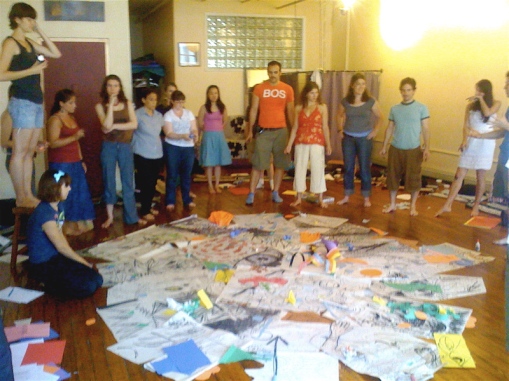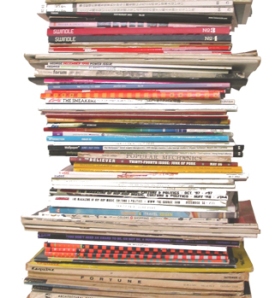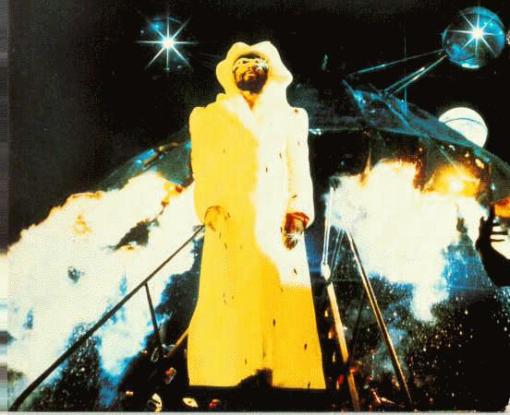Stillman Brown’s post last week about blogging got me thinking about media in general, and I wanted to write a post in conversation with it. The fact that I can do that alone says a lot about what so amazing and new about blogging. The fact that you can then converse with me about my post below, or write your own post, is what is so immensely great about this interdependent media.

But first, here are a few I.D. Project Weekly Updates for this Monday A.M. Post:
The above picture is from Saturday’s I.D. Project NYC arts retreat. There were 25-30 people there, and it was a transcendentally fun experience.
This week’s podcast (click here for the link): “Anger” with yours truly. Upcoming podcasts: IDP NYC teacher Jessica Rasp on “Working with Grief,” IDP Portland teacher Davee Evans on “Consumerism,” and Biosphere Scientist Jane Poynter’s recent guest lecture “Living in the Biosphere.”
Can’t Miss Event This Wednesday: America’s Foremost Eco-Journalist Simran Sethi’s Guest Lecture on “Environmental Justice.” (lecture details here)
I.D. Project Support Update: We now have 99 monthly donors who give an average monthly donation of $18.50 per month (which is great because we suggest $10/month). Anyone want to be donor #100? Click here for some easy-to-do generosity for a good cause
And Now, Death to the Magazines!
Viva Los Blogs!
In my ideal media world, there are no longer any of these:

And these reign supreme:

- (Time Magazine’s Recent Top 25 blogs)
And my internal jury is still out regarding what I want to happen to these:

And don’t even get me started on these:

So why do I love the blog medium so much?
1. Blogging is the most democratic form of communication yet realized. Blogging is what you make of it. Stillman Brown’s post and the cartoon he referenced only referred to the downside of this fact: if a medium is wide-open, with almost no barriers to entry, you can bet some people are going to take the opportunity to mentally masturbate, with lubrication brought to you by wordpress and blogspot, and Perez Hilton, etc. Some people are just not going to work on deeper and meaningful texts, whoever gets to decide what “meaningful” means. But some people—many more than ever before—are also going to take the time to write stories you’d never ever hear about in traditional print and television media, like this very personal story of an environmentalist’s conversation with Joe Biden, which to me is more revealing and informative about the man than anything else I’ve read, and could never have been published anywhere but on a blog that allows anyone to join and post.
Without editors, people are gonna write dumb shit (my editor would probably make me change “gonna write dumb shit,” in fact). People are also going to unleash a messy torrent of brilliance. Al Gore wrote about the internet medium as the saving grace of democracy in The Assault on Reason, (Al is the man) and this is exactly what he meant. On blogs, everything becomes a democratic conversation again. And of course, with freedom of speech, comes dumb expressions about eyestrain. But it’s a side product of a much larger societal benefit.
2. Blogging Allows For An Interwoven, Multilayered, and Conversational Text. The textual possibilities of blogging, with all the cool media and links and clips and other blogs one can embed and reference, complete with comments and conversation and controversy, is much more in touch with the fundamental truth of interdependence. Blogging is truly four-dimensional. Print and television media are “flat” texts, isolated by their packaging from direct living conversation with other texts. With a flat text, someone has to find the links between different pieces of media. With a blog, the link between texts becomes a click of a button, a user-friendly “embed.” Blogs spread out their tentacles of connection like compassionate octopuses.
The downside of this is that interwoven texts can fragment one’s attention (browse much today?), whereas flat texts such as a book or film cause you to settle in and focus attention on one work for longer. In the age of the blog, it becomes much more important to practice mindfulness. But if you do, the full power of interdependent media becomes clear like never before.
3. Blogs Understand Impermanence. When a blog article’s time is past, it does not rot obsolete on a shelf, waiting for the publisher to come out with a new edition to take up more space on Earth. A has-been post fades out quite nicely, and a new, more present-moment article takes its place. Yes, perhaps this fact makes thought and ideas uncomfortably transitory to those of us who want to see our mental creations last forever. But guess what: mental creations are transitory. They do not last, and most do not last long. In the blogosphere, this morning’s news is already old. Maybe that’s harsh, but that’s reality. If blogging were a visual art, it certainly wouldn’t be oil painting. It would be more like a Tibetan sand mandala, constantly sweeping itself away and beginning the conversation anew.

4. Blogs are Eco-Friendly. DEATH TO THE MAGAZINES!!!
This is the most important point. I was surprised last month at the reaction I got when I suggested that people cancel their New Yorker subscriptions in response to the infamous Obama cover, which I consider one of the most horrible (and yes, conscious) editorial decisions in history. But while I think the New Yorker is a pretentious magazine with an elitist editorial system (especially in the fiction realm), and while I think they also needed to feel the effects of their undeniably bad choices in the only way they will understand, I was really asking you to cancel ALL of your magazine subscriptions. Did I just say that? Well, maybe. I really want to have a conversation about it. On a blog. This blog.
Some of my best friends work for the Conde-Nast/Hearst behemoth of magazine production here in NYC, including one of my very closest friends. I’m pretty sure they’ll survive the eventual end of an outdated medium. Nobody will be homeless. If we get a few more donors, we can get them to work for One City.
No matter what beauty or brilliance lies inside their texts, magazines are a tremendously wasteful delivery system for culture and wisdom. If you care about plastic bags, you should also care about magazines. Don’t believe me? Read this. It seems magazines are already feeling the hurt of new media these days.
What About Books? Because books contain a slightly less transitory form of text, I’m not sure how I feel about them in the long run from an enviromental perspective, and need some help to clarify my thoughts on the matter. I do love the feeling of owning a small library of actual books. I am also relieved that my publisher produced the 19,000 copies of One City in print with environmental mindfulness (scroll down when you get there to the environmental statement), and hope all book publishers have similar standards. But I was just talking to my stepmother about the Amazon Kindle book-reader, which she uses and loves, and loves for environmental reasons. Maybe having that physical library is just another way for me to hold on, to attach myself to a reality that is inherently unstable and always in flux, a reality that the blogosphere seems to understand intuitively.
Are blogs the best thing ever? Leave a comment, and by so-doing, prove me right.

